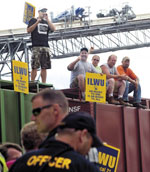
Showdown on West Coast Docks: The Battle of Longview
(November 2011).
click on photo for article
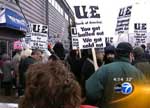
Chicago Plant Occupation Electrifies Labor
(December 2008).
click on photo for article
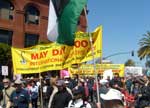
May Day Strike Against the War Shuts Down
U.S. West Coast Ports
(May 2008)
click on photo for article

June 2020
Why Cops
and Their “Unions”
Have No Place in the Labor Movement
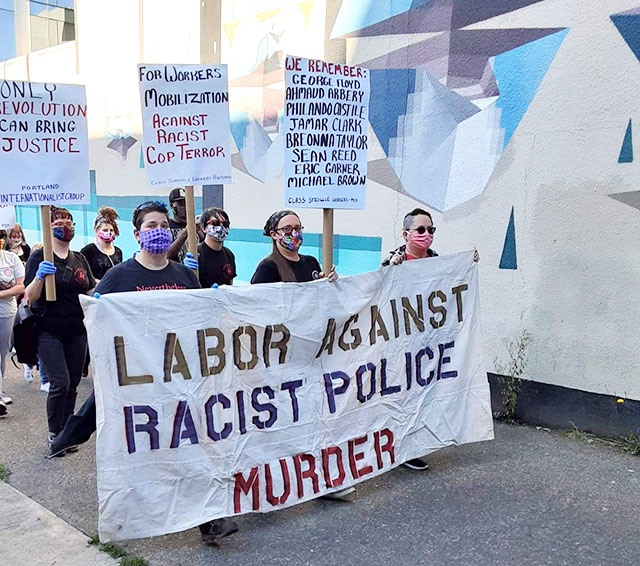
Class Struggle Workers – Portland at protest against Minneapolis police murder of George Floyd, May 31.
(CSWP)
This article originally appeared at Talking Points Memo.
By Becca Lewis
Amidst nationwide protests ignited by the racist police murder of George Floyd, union members everywhere are asking: how can labor throw its weight into the fight to uproot racist repression?
Using our collective power as workers is key. The multiracial working class makes the country’s wheels turn, and can bring them to a halt just as quickly. We have the power to shut down factories and docks, farms and urban transport, food plants and phone service. And now is the time to use it.
But it’s also high time the labor movement cleans its own house. In fact, it’s long overdue. As mass anger at police killings shines the spotlight on police forces’ role as enforcers of racist repression, the time is now to carry through the demand long raised by class-struggle unionists, summed up in the slogan: “Cops out of the unions.”
In the weeks since Minneapolis police murdered George Floyd, cops have responded to mass protests by unleashing more violence on protesters. Yet brutal attacks by police across the country have not stifled the voices of millions. As we march, we chant to remember and honor those, like George Floyd, whose lives were cut short by endless racist terror.
Breonna Taylor, shot dead as she slept in her bed in Louisville.
Jamel Floyd died in New York after guards pepper-sprayed him in his prison cell.
Derrick Scott in Oklahoma City, who – like Eric Garner and George Floyd – died saying, “I can’t breathe.” One of the cops holding him down responded: “I don’t care.”
Here in Portland, Oregon, we remember Jason Washington, a member of the National Association of Letter Carriers, shot dead by university police.
Sean Reed, Ahmaud Arbery, Philando Castile, Sandra Bland…
And in recent days, we learned Atlanta police shot and killed a 27-year-old black man named Rayshard Brooks.
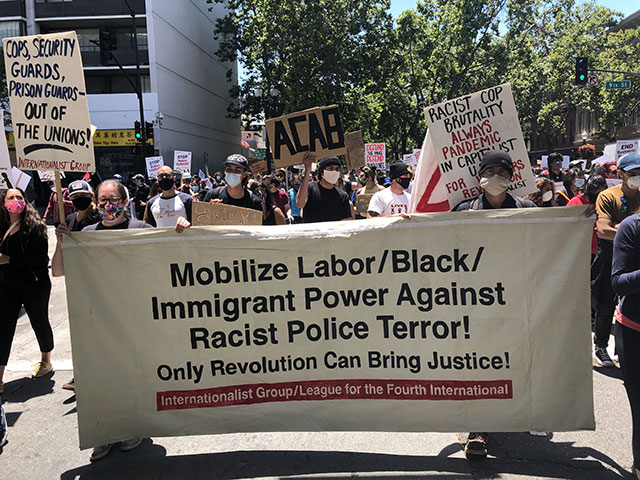
Juneteenth: 19 June 2020, at rally in Oakland, California in conjunction with the shutdown of all U.S. West Coast ports by the International Longshore and Warehouse Union (ILWU) in protest against racist police brutality.
(Internationalist photo)
As the list keeps growing, we in labor’s ranks join millions searching for an answer to how and when police killings and brutality will end. Workers like me want police “unions” ousted from the labor movement and want cops of all kinds removed from unions and union bodies now: this will be a crucial part of unchaining labor’s power in the fight against racial oppression.
The fact is, we face a glaring contradiction with the inclusion of police in the labor movement. The struggle against racist oppression is crucial to labor’s cause, but the professionals of repression are included in one labor body after another. Freeing labor from any and all affiliation with the cops is crucial to the revitalization of unions, which is a matter of life or death for the labor movement. Yet despite recent efforts by the Writers Guild of America, East and others to rightly call for the expulsion of the International Union of Police Associations from the AFL-CIO, the push has been met with resistance – the AFL-CIO rejected WGAE’s call earlier this month. When members of the labor officialdom try to stop or divert this vital fight, they are wielding the very outlook and policies that have drastically undercut and weakened our movement for years.
We must resolve this contradiction now if labor is genuinely going to unite with the aspirations of a new generation of workers who want to uproot racism – and if the labor movement is going to transform itself into an instrument for the emancipation of the working class and the oppressed.
As a longtime union activist here in the Pacific Northwest – a region plagued by far-right and white-supremacist forces, as well as attempts to impose union-busting “right-to-work” laws – the fight to oust cops from the unions is linked to all of our efforts to put workers’ solidarity into practice. When trade unionists here mobilize against racist attacks and provocations by far-right and fascist groups, police use the tools of their trade – batons, teargas, flash-bang grenades and pepper balls – to repress the anti-racist protesters.
A vivid example occurred in 2017 after a local fascist stabbed to death two people who opposed his racist rampage against teenage African American women on the MAX light rail train. Days after the attack, far-right groups staged a dangerous provocation in our city. Portland Labor Against the Fascists brought out members of 14 unions to stop it. As has repeatedly occurred, a year after the incident, Portland police were caught coordinating with the far-right groups holding a similar rally. The police encouraged the far-right provocations and provided some of those carrying them out with escorts and transport.
Today in Portland, as elsewhere, many of our fellow unionists who work in media have taken to removing logos from their clothing and cameras while covering protests because — like legal observers dragged off to jail when cops yell “round up the green hats” — journalists have been targeted by the police.
Labor playing the role it must in the fight against racist repression is flatly counterposed to harboring organizations whose purpose is to push the claims, and shield the crimes, of the police. And that is precisely what cops’ so-called “unions” are all about. When Minneapolis banned “warrior training” for cops last year, the police “union” even announced that it would provide such training for free.
While labor bodies like WGAE push for disaffiliation with the International Union of Police Associations, the effort is just one drop in one very large bucket. IUPA is just one of the entities representing the demands and interests of the repressors in blue. “We have a dozen affiliate unions that represent law enforcement in some form,” the AFL-CIO Executive Council noted in its June 10 statement opposing WGEA’s demand. Instead, it’s calling for police groups to adopt a “code of excellence.” This would be the equivalent of cops taking a knee before they go out yet again to bust heads and round up anti-racist protesters.
While police associations are not workers unions, many actual unions (AFSCME, the CWA, SEIU, Teamsters and others) have brought “law enforcement” and repression-industry sectors into their ranks. Having professional strikebreakers in the unions — when unionists face repression from cops and guards in every strike — is a recipe for defeat.
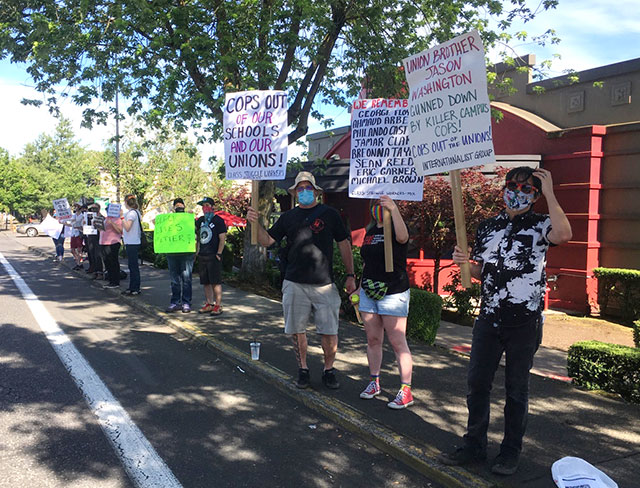
Class Struggle Workers – Portland at anti-racist protest called by IBEW Local 48, June 18. (CSWP)
The AFL-CIO leadership’s position would only discredit unions in the eyes of a new generation that must be won over to the cause and struggle of labor. And it delivers a slap in the face to countless unionists subjected to police violence, teargas and sonic weapons for protesting racism or standing on a picket line. The officialdom claims that maintaining the affiliation of police is a question of – wait for it – “unity.” Cops’ billy clubs may “unite” with our heads, but real unity of workers, against racist repression, means uncuffing labor from “unity” with those swinging the batons.
The shopworn claim that it’s just a “few bad apples” involved in police brutality across the U.S. is starkly exposed by current events. When police terrorize black communities, target protesters and break up union pickets, they are literally doing their job — a role integral to the profit system, in which racial oppression has always been key to capitalists’ wealth and power. There is no reform or code, no set of rules or oversight that can change the basic role of the police, and they don’t belong in our unions in any form.
Just digging into the history of the police in America, which began as slave patrols, reveals how central it has always been to racial oppression.
After the Civil War, the promise of black freedom through Reconstruction was betrayed. As industry grew, labor — both black and white — faced bloody police intervention. As black workers took the lead in bringing the 1877 labor upheaval into the South, the cops were there to bloodily break up interracial workers’ struggles. When Democratic Party “Redeemers” imposed Jim Crow, the cops were there to enforce “law and order.” Up North, police joined post-WWI pogroms against black communities, while police frame-ups and vigilante lynchers took the lives of immigrant workers like Sacco and Vanzetti, IWW bard Joe Hill, his Native American comrade Frank Little and innumerable other heroes of labor.
Down the decades, from police massacres of striking dock workers in San Francisco and “Little Steel” strikers in Chicago, to the police murder of black teenager Larry Payne in the 1968 Memphis Sanitation Strike to today, strike-breaking and racist repression are central to the history of labor struggle, and of the police.
When police aren’t enough, companies rely on assistance from security guards like the Pinkertons (currently known as Securitas Security Services), infamous for strike-breaking as “just part of the job” of protecting capitalist property and making sure that bosses can keep unions in check.
On June 2, Minneapolis Public Schools voted to cut ties with the police department. This important step should spread to other cities. And it means opposing any attempts to replace them with private security guards or some other police department, which would mean more of the same.
Today, all labor faces the old question: Which side are you on?
When painters, construction workers, stage hands and others formed Class Struggle Workers – Portland six years ago, we saw the need to end labor’s subjugation to the bosses’ institutions, politicians and parties, and for building a workers’ party. One of our key inspirations was black and white unionists’ struggle to oust police from the municipal workers union in Brazil’s “Steel City.” Our founding program states: “Police, prison guards and security guards are the armed fist of capital, part of the apparatus of anti-labor, racist repression: they must be removed from the unions.”
To unchain the power of labor in the fight against racism and repression, this contradiction must be resolved.
If not now, when?
Becca Lewis is a member of the IATSE L. 28 union and a founding member of Class Struggle Workers – Portland.